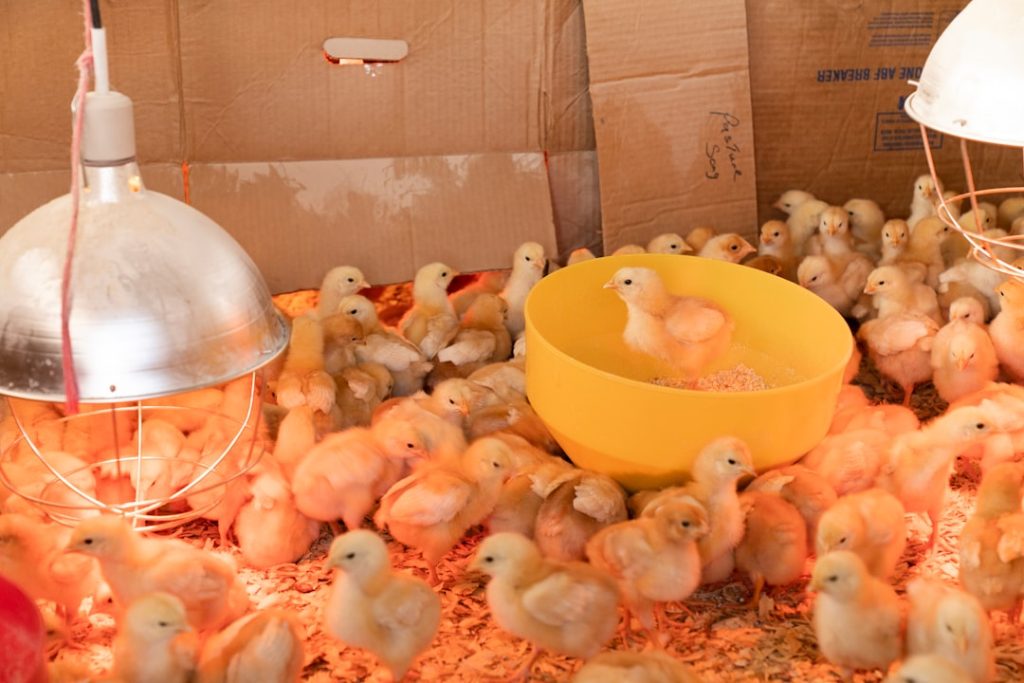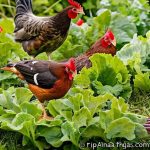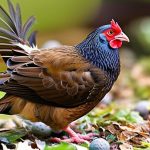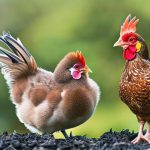Chickens and ducks have specific needs during winter to maintain their health and well-being. Both species are vulnerable to cold temperatures and require protection from harsh winter weather. A warm, dry environment is essential for their survival, as they are not naturally equipped to handle extreme cold.
Fresh water and high-calorie foods are necessary to maintain their energy levels and body heat. Chickens and ducks have different winter care requirements. Chickens are generally more cold-hardy than ducks due to their insulating layer of feathers.
However, they still need a draft-free, dry shelter for roosting at night. Ducks have less insulating feathers and are more prone to frostbite, necessitating extra protection from the cold. To provide optimal care, it is important to understand the unique needs of each species.
Chickens require a secure coop with proper ventilation and insulation. Ducks need a sheltered area with protection from wind and moisture. Both species benefit from additional bedding material during winter to help retain heat.
Proper nutrition is crucial during colder months. Chickens and ducks require increased caloric intake to maintain body temperature. Providing warm water and preventing it from freezing is also essential for their health and hydration.
By understanding and addressing these specific winter needs, poultry keepers can ensure the comfort, safety, and well-being of their chickens and ducks throughout the colder months.
Table of Contents
- 1 Providing Adequate Shelter and Insulation
- 2 Using Heat Lamps and Heated Waterers
- 3 Offering High-Calorie Foods and Supplements
- 4 Ensuring Proper Ventilation and Air Circulation
- 5 Protecting Against Frostbite and Hypothermia
- 5.1 Winter Care for Chickens and Ducks
Frostbite is a common concern for chickens and ducks during the winter months, especially in extremely cold temperatures. It occurs when extremities such as combs, wattles, toes, or feet are exposed to freezing temperatures for an extended period of time.
- 5.2 Hypothermia in Chickens and Ducks
- 5.3 Monitoring for Signs of Distress
- 5.1 Winter Care for Chickens and Ducks
- 6 Monitoring and Adjusting Care as Needed
- 7 FAQs
- 7.1 What are some ways to keep chickens and ducks warm in winter?
- 7.2 How can I insulate the coop to keep chickens and ducks warm in winter?
- 7.3 Is it safe to use heat lamps or heated pads for chickens and ducks in winter?
- 7.4 What bedding materials are best for keeping chickens and ducks warm in winter?
- 7.5 Should I adjust the chickens’ and ducks’ diet in winter to help keep them warm?
Key Takeaways
- Chickens and ducks need special care in winter to stay healthy and comfortable
- Adequate shelter and insulation are essential for protecting poultry from harsh winter conditions
- Heat lamps and heated waterers can help maintain a comfortable environment for chickens and ducks
- High-calorie foods and supplements can provide extra energy to help poultry stay warm in winter
- Proper ventilation and air circulation are important for preventing moisture buildup and maintaining air quality in the coop
Providing Adequate Shelter and Insulation
Constructing a Well-Protected Coop
A well-constructed coop or shelter is essential for protecting chickens and ducks from the cold, wind, and moisture. The coop should be draft-free, dry, and well-ventilated to prevent the buildup of moisture, which can lead to respiratory issues.
Insulating the Coop for Warmth
Insulating the coop with materials such as straw, hay, or wood shavings can help retain heat and keep the birds warm. Additionally, providing a roosting area off the ground will help prevent their feet from getting cold and wet. Ensuring that the coop is well-maintained and free from drafts will help keep chickens and ducks comfortable and healthy during the winter months.
Maintaining a Clean and Dry Coop
In addition to providing a well-insulated shelter, it’s important to make sure that the coop is clean and dry. Moisture can be a major issue in winter, as it can lead to frostbite and respiratory problems in chickens and ducks. Regularly cleaning out bedding and removing any wet or soiled material will help prevent moisture buildup and keep the coop dry. Adding extra bedding during the winter months can also provide additional insulation and warmth for the birds.
Using Heat Lamps and Heated Waterers

In some cases, providing additional heat may be necessary to keep chickens and ducks warm during the winter. Heat lamps can be used to provide supplemental warmth in the coop, especially during extremely cold temperatures. It’s important to position heat lamps safely to prevent fire hazards and ensure that they are out of reach of the birds.
Additionally, using heated waterers can help prevent water from freezing, ensuring that chickens and ducks have access to fresh water at all times. Keeping waterers in a sheltered area or using heated bases can help prevent them from freezing in cold temperatures. By using heat lamps and heated waterers, you can help maintain a comfortable environment for chickens and ducks during the winter months.
While heat lamps and heated waterers can be beneficial in providing additional warmth for chickens and ducks, it’s important to use them with caution. Heat lamps should be securely mounted to prevent them from falling or coming into contact with flammable materials. Additionally, it’s important to monitor the temperature in the coop to ensure that it doesn’t become too hot, which can be harmful to the birds.
Using heated waterers with built-in thermostats can help regulate the temperature of the water and prevent it from freezing without overheating. By using heat lamps and heated waterers responsibly, you can provide the extra warmth that chickens and ducks need to stay comfortable during the winter months.
Offering High-Calorie Foods and Supplements
During the winter months, chickens and ducks require additional calories to maintain their energy levels and stay warm. Offering high-calorie foods such as cracked corn, sunflower seeds, or mealworms can help provide the extra energy that they need. These foods are high in fat and protein, which can help keep chickens and ducks warm during cold weather.
Additionally, providing supplements such as poultry vitamins or electrolytes can help support their immune systems and overall health during the winter months. By offering high-calorie foods and supplements, you can help ensure that chickens and ducks have the energy they need to stay healthy and comfortable in colder temperatures. In addition to high-calorie foods and supplements, it’s important to make sure that chickens and ducks have access to fresh water at all times.
Dehydration can be a major issue in winter, as water sources can freeze over. Using heated waterers or regularly checking water sources to ensure they haven’t frozen will help prevent dehydration in chickens and ducks. Additionally, providing warm water or adding electrolytes to their water can encourage them to drink more during colder weather.
By offering high-calorie foods, supplements, and ensuring access to fresh water, you can help support the nutritional needs of chickens and ducks during the winter months.
Ensuring Proper Ventilation and Air Circulation
Proper ventilation is essential for maintaining a healthy environment for chickens and ducks during the winter months. While it’s important to keep coops draft-free to prevent cold air from entering, it’s equally important to ensure that there is adequate ventilation to prevent moisture buildup. Moisture from droppings, respiration, and water sources can lead to high humidity levels in the coop, which can cause respiratory issues in chickens and ducks.
Providing proper ventilation will help remove excess moisture from the air and prevent respiratory problems. Additionally, good air circulation will help distribute heat evenly throughout the coop, keeping chickens and ducks comfortable during colder temperatures. In addition to ventilation, it’s important to make sure that bedding is kept clean and dry to prevent moisture buildup.
Wet bedding can contribute to high humidity levels in the coop, so regularly cleaning out soiled bedding and adding fresh material will help maintain a dry environment for chickens and ducks. Providing good air circulation by keeping windows or vents open (while still preventing drafts) will help ensure that fresh air is circulating throughout the coop. By ensuring proper ventilation and air circulation, you can create a healthy environment for chickens and ducks to thrive during the winter months.
Protecting Against Frostbite and Hypothermia

Winter Care for Chickens and Ducks
Frostbite is a common concern for chickens and ducks during the winter months, especially in extremely cold temperatures. It occurs when extremities such as combs, wattles, toes, or feet are exposed to freezing temperatures for an extended period of time.
Preventing Frostbite
To prevent frostbite, it’s essential to provide adequate shelter with insulation, keep bedding dry, and avoid exposing birds to extreme cold for prolonged periods. Additionally, applying petroleum jelly or other protective ointments to vulnerable areas can help prevent frostbite in chickens and ducks.
Hypothermia in Chickens and Ducks
Hypothermia occurs when birds are unable to maintain their body temperature due to prolonged exposure to cold temperatures or wet conditions. Providing a warm shelter with proper insulation, using heat lamps if necessary, offering high-calorie foods, and ensuring access to fresh water can help prevent hypothermia in chickens and ducks.
Monitoring for Signs of Distress
Monitoring their behavior for signs of distress or discomfort such as shivering or lethargy can help identify early signs of hypothermia so that appropriate measures can be taken to warm them up. By protecting against frostbite and hypothermia, you can help ensure that chickens and ducks stay healthy and comfortable during the winter months.
Monitoring and Adjusting Care as Needed
Monitoring the health and behavior of chickens and ducks throughout the winter is crucial for identifying any issues that may arise due to cold weather conditions. Regularly checking on them for signs of distress or discomfort such as shivering, lethargy, or changes in appetite can help identify potential problems early on. Adjusting care as needed by providing additional warmth, offering high-calorie foods or supplements, or making changes to their environment can help address any issues that may arise during colder temperatures.
Additionally, staying informed about weather forecasts will help you prepare for extreme cold or inclement weather conditions that may impact your birds. Taking proactive measures such as adding extra insulation, providing additional heat if necessary, or ensuring that water sources are not freezing over will help keep chickens and ducks comfortable during harsh winter conditions. By monitoring their health and behavior closely and adjusting care as needed, you can provide the best possible care for chickens and ducks throughout the winter months.
In conclusion, understanding the needs of chickens and ducks in winter is essential for providing proper care during colder temperatures. By providing adequate shelter and insulation, using heat lamps and heated waterers responsibly, offering high-calorie foods and supplements, ensuring proper ventilation and air circulation, protecting against frostbite and hypothermia, and monitoring their health closely, you can create a comfortable environment for chickens and ducks to thrive during the winter months. Taking proactive measures to address their specific needs will help ensure that they stay healthy, happy, and comfortable despite the challenges of winter weather.
If you’re looking for tips on how to keep chickens and ducks warm in winter, you might also be interested in learning about the benefits of an A-frame chicken coop. This type of coop design can provide a cozy and insulated space for your poultry during the colder months. Check out this article for more information on how to create a comfortable and warm environment for your feathered friends.
FAQs
What are some ways to keep chickens and ducks warm in winter?
Some ways to keep chickens and ducks warm in winter include providing a well-insulated coop, using heat lamps or heated pads, and ensuring they have access to fresh bedding.
How can I insulate the coop to keep chickens and ducks warm in winter?
You can insulate the coop by sealing any drafts, adding extra bedding, and using insulating materials such as straw or hay. It’s important to ensure proper ventilation while insulating to prevent moisture buildup.
Is it safe to use heat lamps or heated pads for chickens and ducks in winter?
Yes, it is safe to use heat lamps or heated pads, but it’s important to follow safety guidelines to prevent fires and ensure the animals can’t come into direct contact with the heat source.
What bedding materials are best for keeping chickens and ducks warm in winter?
Bedding materials such as straw, hay, and wood shavings are good options for keeping chickens and ducks warm in winter. These materials provide insulation and help absorb moisture.
Should I adjust the chickens’ and ducks’ diet in winter to help keep them warm?
Yes, you can adjust their diet by providing extra calories and nutrients to help them generate more body heat. This can include offering high-energy foods like cracked corn and increasing their protein intake.

Meet Walter, the feathered-friend fanatic of Florida! Nestled in the sunshine state, Walter struts through life with his feathered companions, clucking his way to happiness. With a coop that’s fancier than a five-star hotel, he’s the Don Juan of the chicken world. When he’s not teaching his hens to do the cha-cha, you’ll find him in a heated debate with his prized rooster, Sir Clucks-a-Lot. Walter’s poultry passion is no yolk; he’s the sunny-side-up guy you never knew you needed in your flock of friends!
Meet Walter, the feathered-friend fanatic of Florida! Nestled in the sunshine state, Walter struts through life with his feathered companions, clucking his way to happiness. With a coop that’s fancier than a five-star hotel, he’s the Don Juan of the chicken world. When he’s not teaching his hens to do the cha-cha, you’ll find him in a heated debate with his prized rooster, Sir Clucks-a-Lot. Walter’s poultry passion is no yolk; he’s the sunny-side-up guy you never knew you needed in your flock of friends!







